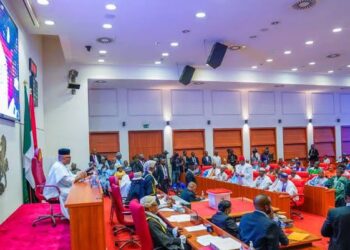Nigerian lawyers have shared their views on the proposed derivation of Value Added Tax (VAT) based on consumption.
The Tax Reform Bills draft was framed by a team led by Mr. Taiwo Oyedele, Chairman of the Presidential Fiscal Policy and Tax Reforms Committee.
Oyedele had criticized the injustice in the current mode of VAT distribution, which considers the location where VAT is remitted, rather than where goods are supplied or consumed.
The federal government maintains that the fiscal reform agenda will devolve more resources to Nigeria’s state and local governments, ultimately benefiting the Nigerian people and fostering a democracy that works for them.
In an exclusive interview with Nairametrics, prominent legal practitioners shared their views on the bills and made recommendations to relevant stakeholders.
Contentions Surrounding VAT
A key issue associated with the Tax Reform Bills is how VAT will be applied.
- At a recent event with tax consultants, Oyedele stated that it is inappropriate for multiple consumption taxes to exist across states, emphasizing that states should discontinue their consumption taxes.
“Why don’t we just eliminate these other consumption taxes? Let’s focus solely on VAT. Make it an incentive for them. Tell the federal government, ‘Please, cede 5% of your VAT revenue to states.’ So, the federal government collects 15%, and states begin collecting 10%,” he suggested.
“Let’s give the extra 5% to states. Based on the VAT collection trend for 2024, that 5% will be close to N350 billion, which is more than five times what states are currently collecting from consumption taxes,” he added.
- However, Governors of the 19 Northern states, along with traditional rulers and stakeholders from the region, have expressed opposition to the bill, particularly concerning the draft for VAT distribution based on derivation. Most lawmakers from the Northern bloc have aligned with their position.
What Nigerian lawyers are saying
Ahmed Raji, SAN, in an exclusive interview with Nairametrics, advised that a potential solution would be to acknowledge that VAT is a consumption tax.
- He noted that VAT, as a consumption tax not covered by the exclusive list and not expressly mentioned in the 1999 Constitution, should be regulated by each state.
- Raji explained that the federal government should handle VAT related to imports
- and exports, while each state should manage its own VAT, with exceptions for imports, exports, and free trade zones (assuming VAT applies there).
“For example, if banks in Kano are doing daily transactions, the tax authority in Kano should be able to inspect their books and collect VAT from them. They don’t have to remit everything to the Headquarters. By devolving VAT powers to the states, this issue would be resolved, akin to the sales tax system in the U.S., where each state manages its own tax laws. There is no central tax law in America,” he said.
- Raji believes that allowing states to manage their own VAT would foster healthy competition, encouraging more aggressive tax regimes and the pursuit of optimal systems.
- He also emphasized the need for collaboration and public sensitization to ensure the public understands the benefits of the proposed tax bills.
- Raji advised the federal government to engage state governors and other stakeholders constructively so that they understand the benefits of the proposed tax reforms.
- He also advocated for more Town Hall meetings across Nigeria’s six geopolitical zones to clarify any grey areas of the bills.
“I’m not saying FIRS is right, or the Governors’ Forum is wrong. There should be collaboration, sensitization, and the exchange of ideas between both parties. However, they should not just dismiss the bill outright,” he said.
- Chief Rafiu Oyeyemi Balogun, SAN, in an exclusive interview, explained that the contentions surrounding the new Tax Reform Bills, which have passed their second reading in the National Assembly, are not unexpected given Nigeria’s diverse tribes and religious differences.
- He cautioned that rejecting the bill entirely could be counterproductive, potentially hindering the growth of tax administration and governance in Nigeria.
- He advised that the rule of law should prevail, allowing stakeholders to present their positions on the bills to the National Assembly for consideration.
“The Northern Governors’ Forum should assemble a team of tax practitioners, administrators, and legal experts to comprehensively study the bills, identify sections that should be amended or removed, and present well-reasoned arguments for their position. These findings should be presented to the National Assembly and defended during the public hearing,” he said.
- If the derivation principles in VAT revenue distribution are the core issue in some quarters, Balogun suggested that this concern could be singled out and addressed separately.
- In a statement shared with Nairametrics, Dr. Olisa Agbakoba, SAN, expressed support for the tax reform bill from a revenue generation perspective, particularly as it targets corporate entities and the wealthier classes.
“Northern Nigeria may have a valid concern. We’ve always distributed revenue based on clear principles. So, the North is asking why the revenue-sharing formula in the proposed Tax Reform bill isn’t aligned with how we share oil revenue. This is a significant issue,” he said.
Agbakoba stressed that Nigeria will continue to struggle with equitable revenue distribution until it devolves revenue collection to the states, which would require a significant decentralization of power.
“My honest opinion is that it’s long overdue for political and economic power to be devolved from the Federal Government to states, and from states to local governments. This is the only way the economy can shift from relying on shared revenue to generating its own,” he concluded, adding that consumption tax should go to the states where the revenue is generated.






















